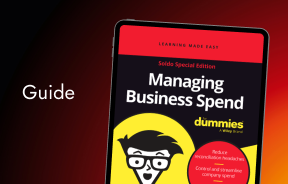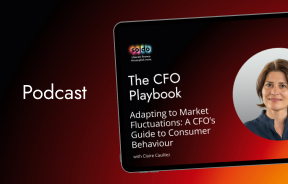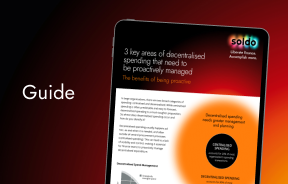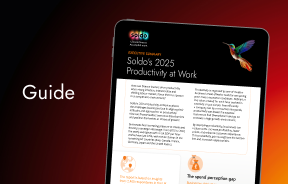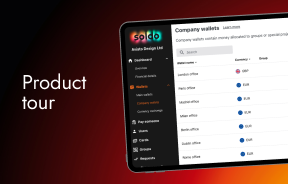59 Get Everything You Can Out of Technology with Ben Chrnelich, CFO at Symphony.com
This episode of the CFO Playbook features an interview with Ben Chrnelich, CFO at Symphony.com. Ben has a passion for Capital Markets Technology. He has spent his career focused on enabling trading organizations to utilize technology that drives efficiency and productivity. Always aspiring to become a CFO, Ben sees technology as a tool that can empower financial leaders to have an impact at organizations that previously was not possible because the volume of work was too much and too manual.
Over the past two decades Ben has held financial and management leadership positions at Charles Schwab, Lehman Brothers, NYSE and IPC where he drove business strategy to adapt to the constantly evolving trading landscape. When not working, Ben is on the pitch, coaching soccer for NJ ODP and his daughter’s teams.
In this episode of the CFO Playbook, Ben talks about his appreciation for the rate of change that technology is bringing both to capital markets and the finance profession. He feels adapting to the new wave of technology applications is paramount to success, giving companies the tools needed to gather the information and data they need. Ben sees these self-serving tools as a way to create a far more dynamic, explorative, and effective type of collaboration within companies that can bring down information barriers and remove friction from daily finance functions. He also discusses his path to becoming a CFO, the importance of being a passionate and excited leader, and other traits he sees as important to being a partner and guiding finances within any organization.
Take The CFO Playbook Listener Survey to help us improve the show. You’ll also be entered to win your choice of the latest iPad Pro or a Samsung Galaxy S7.
——–
Time Stamp Topics:
00:10 Career Path to CFO and Technology’s Pace of Change
05:00 Technology in Finance and Capital Markets
06:00 Technology’s Impact on Workflows and Software
07:00 Development and Accessibility of Finance Systems
09:00 Self-serving Technology Tools Bringing Down Information Barriers
11:00 Real-Time and Relevant Insights
13:45 Listening, Learning and Effort
16:30 Being Effective and the Evolving Role of the CFO
23:00 CFO Rules of Thumb for Leading
27:00 Building the Best Team and Leadership Development
30:30 Being a Reliable and Encouraging Leader
33:30 Liberating Teams from Administrative Work
36:30 Technologies for the Future
40:00 Tips for Being a Successful CFO
——–
Sponsor:
This show is brought to you by Soldo, the brighter way to manage business spending and expenses. With Soldo, you can control every expense, track spend in real time, automate financial reporting, and then use those insights to fuel growth. Learn more at Soldo.com
——–
Links
The CFO Playbook Listener Survey
——–
Ben’s Playbook: Technology Triumphs for Finance Functions
Ben Chrnelich, CFO at Symphony.com, has a passion for Capital Markets Technology and has spent his career focused on enabling trading organizations to utilize technology that drives efficiency and productivity. Always aspiring to become a CFO, Ben sees technology as a tool that can empower financial leaders to have an impact at organizations that previously were not possible because the volume of work was too much and too manual.
In the latest episode of the CFO Playbook, Ben talks about his appreciation for the rate of change that technology is bringing both to capital markets and the finance profession. He discusses the importance of why adapting to new wave of technology applications is paramount to success and empowers companies with the tools to get the information and data they need. Ben details how these self-serving tools provide an opportunity to create a far more dynamic, explorative, and effective type of collaboration within the companies that can bring down information barriers and remove friction from daily finance functions.
Information and Insight is Gained through Technology
Using technology can allow you to significantly reduce the amount of time it takes to get information on financials and business performance, providing faster and more accurate data. Information is so valuable that you need to be able to look at numbers in real-time and reduce close cycles. The best way to do that is with a thoughtful technology platform behind it.
“Without a high level of technology, access, and development in financial applications, it’d be very difficult to provide the information to a wide group of people. At the same time, you, as a CFO, would spend all your time just talking about numbers, as opposed to creating the environment that you can distribute that information out to all the interested parties.”
Narratives are Necessary for Numbers
You have to dig deep to understand the economics of business. Don’t just look at the surface level numbers, find what are the drivers underneath. You have to be able to translate numbers to a business story or outcome and tie them back to the real world. It is important for a CFO to be able to traverse across the whole business environment, seamlessly weaving in numbers, operating metrics, product results, and customer impact. This is part of putting together a comprehensive narrative of the business to explain what matters and why to non-financial or sophisticated business people.
“Your intellectual curiosity is paramount. Eventually the numbers tell you everything, but they don’t tell you everything if you don’t spend time understanding how they’re built, how they’re generated, and what themes are coming out of the numbers. So, you really need to have that intellectual curiosity.”
Communication is Key
CFO’s need to have compassion and excitement for the business and industry that they work in, being able to communicate effectively and concisely to a wide variety of constituents. As a CFO you need to be able to communicate and understand the audiences you deal with in their own language, while also having a deep understanding of your own business, as well as the customers’ products and needs.
“You have to be viewed as a proxy for the CEO and you have to be, in the CEO’s mind and understand their strategy of how they’re looking to run the company, what they’re being measured on, what are the stress areas that are consuming their time, what are the success areas that they’re looking to drive, and making sure that there’s a really strong connection between the strategic and operating decisions that get made, that ultimately, the CEO makes and the financial outcomes that the CFO is looking to drive.”
Lead by Example
If you don’t have leadership ability across the organization and the team then it will be difficult to drive a strategy that you want to implement. As a leader you have to be an individual contributor, being able to do your own work and your own analysis. Be an example to your team. If you’re willing to do the work that anyone else on your team does, that’s a good way to teach others what you’re looking for and how to structure a message and communicate it.
“Part of being a leader is you have to expose yourself. And, it’s a little bit of a cliche, but you have to get comfortable with being uncomfortable. You have to put yourself out there a little bit. You have to know that if you put your head out, it might get knocked around a little. But, as long as you can keep doing that over time, you’re going to be able to figure out how to lead. And people will look at that as someone that’s comfortable taking a risk and pushing them forward.






